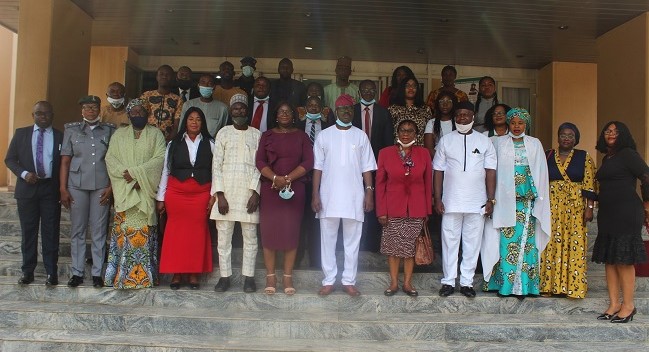The Federal Government on Wednesday, December 9, 2020 reiterated its commitment to ensuring safe use of modern biotechnology to boost the nation’s economy and food security.

Dr Rufus Ebegba, Director-General, National Biosafety Management Agency (NBMA), made the commitment at a meeting in Abuja on “The Validation of National Biosafety Guidelines for Gene Editing in Nigeria”.
The NBMA Act was amended in 2019, and its scope expanded to include emerging aspects of modern biotechnology, which include gene editing and bio-security.
Ebegba said that Federal Government believed in the use of Science and Technology to drive the nation’s economy and improve the livelihood of Nigerians.
He said that, in the face of economic recession, innovations and other means of driving economies were highly needed.
The director-general said Science and Technology was needed more than ever to drive the nation’s economy, adding that Nigeria had placed its use before the national system to ensure the growth of economy.
Ebegba said that Federal Government was very proactive on the issue of rapidly growing modern biotechnology, being the reason why government, through the NBMA, decided to develop guidelines on gene editing.
“The agency, with other line ministries and various stakeholders, have been editing these guidelines over the months.
“We have subjected the guidelines to international review, scientific review, which include the National Biotechnology Development Agency.
“All these are with a view to ensuring that this document is wholesome and widely accepted by all.
“Gene editing is a strong powerful tool and one of the emerging aspects of modern biotechnology that can go beyond the normal genetic engineering process.
“So, we have taken it upon ourselves to ensure that the products that will be derived from gene editing process, will be safe for human consumption and to the environment,” he said.
The agency director-general said that once the document was validated at the meeting, more adjustments would be made until it became a national document by the Federal Government on regulating gene editing.
The document was eventually validated and was presented to the NBMA DG/CEO, who presented it to the public, announcing that the guideline had become a public document.
Also, Mrs Modupe Adeyemo, the Programme Office, African Union Development Agency (AUDA-NEPAD), African Biosafety Network of Expertise (ABNE), said that technological advancement from innovations in plant and animal breeding could advance global agriculture sustainability goals and transform societies.
Adeyemo said that gene editing was increasingly assuming an important space in the technological and regulatory discourse.
According to her, it provided tools at a relatively low cost and reduced timelines for innovations in agriculture and bioeconomy.
She said the growing use of gene editing had policy implications including considerations for human health and environmental safety.
“The use of gene editing requires biosafety policies to ensure that potential benefits are harnessed while minimising potential risks,” Adeyemo said.
She said that the validation meeting was important as it offered the opportunity for all stakeholders to work together towards creating an enabling legal environment for the regulation of gene editing in Nigeria.
Adeyemo said that the AUDA-NEPAD ABNE remained committed to forging strategic partnerships that would have a transformative impact on the continent.
Some stakeholders at the meeting include representatives from the Ministry of Justice; Ministry of Agriculture and Rural Development; Nigeria Customs; Seed and Grain Companies and All Farmers Association.
By Okeoghene Akubuike
